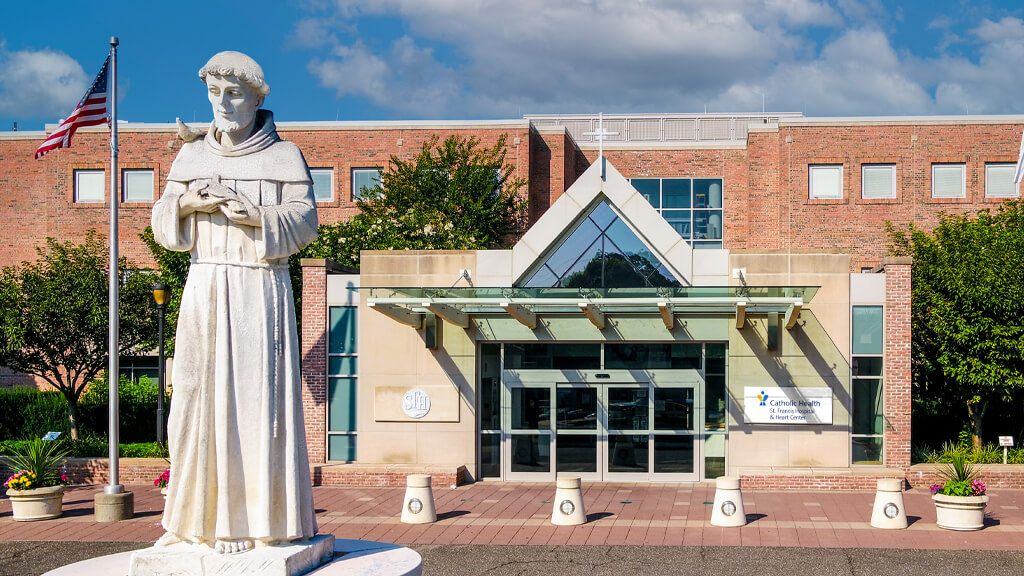Heart Valve Care Across Long Island
St. Francis Heart Center is a leader in the safe and effective treatment of aortic stenosis and mitral valve disease to help you live an active and healthy life. Our dedicated and compassionate team of board-certified interventional cardiologists, cardiothoracic surgeons and highly-trained heart and vascular staff give you the best heart valve repair and replacement outcomes using minimally invasive procedures whenever possible.
While open-heart surgery has been standard for treating conditions like aortic valve stenosis, our pioneering cardiologists are experts in transcatheter aortic valve replacement (TAVR) procedures that offer patients the latest advances in catheter-based, minimally invasive surgery.
You will find heart valve specialists and services at Catholic Health's heart valve centers in Nassau and Suffolk counties. Our centers are a one-stop destination for the screening and treatment of valve disease.
Our Approach
Our multidisciplinary approach includes nationally recognized interventional cardiologists and cardiothoracic surgeons who work together to determine the safest and most successful course of treatment for your condition. We provide same day testing and consultation. Treatment depends on the type and severity of your heart valve disease.
Your cardiac care team will screen, evaluate and determine the best treatment for your specific heart valve condition. Screenings include:
- Echocardiogram. Sound waves create pictures of the heart and the blood flow through the heart. These pictures are more detailed than standard X-ray images.
- Computerized Tomographic Angiography (CTA). Conventional computerized tomographic (CT) scans and intravenous injections of a contrast dye create detailed images of the blood vessels in the chest, abdomen and pelvis.
- Pulmonary Function Test. A group of tests that measure how well the lungs work. During the test, you breathe into a mouthpiece that is connected to an instrument called a spirometer. The spirometer records the amount and the rate of airflow as you breathe in and out over a period of time.
The aortic valve controls blood flow from the heart to the rest of the body. Aortic stenosis (AS) occurs when the aortic valve doesn’t open properly. This forces your heart to work harder to pump blood throughout your body. Over time, the heart muscle weakens. This affects your overall health and keeps you from participating in normal daily activities. Left untreated, severe AS can become a serious, life-threatening condition that leads to heart failure and increased risk for sudden cardiac death. Severe AS is not always preventable and may cause narrowing of the aortic valve.
Risk factors include:
- Age
- High cholesterol
- Radiation therapy
- Rheumatic fever (childhood bacterial infection of the heart)
- Stenosis (buildup of calcium deposits that narrows the aortic valve)
Signs and symptoms include:
- Chest pain or tightness
- Dizziness
- Fatigue
- Feeling faint or fainting with activity
- Murmur (unusual sound heard during a heartbeat)
- Palpitations (irregular heartbeats)
- Shortness of breath
The mitral valve keeps blood flowing from the left atrium to the left ventricle of the heart. Mitral valve disease develops when the valve doesn’t work correctly.
Types of mitral valve conditions include:
- Mitral stenosis. Narrowing of the mitral valve opening, causing less blood to flow from the left atrium to the left ventricle. The restricted blood flow causes the left atrium to enlarge. Mitral stenosis almost always results from rheumatic fever, a childhood bacterial infection of the heart. Symptoms are similar to those of aortic stenosis (AS).
- Mitral valve regurgitation (leaky valve). Occurs when the flaps or leaflets of the mitral valve don’t close tightly, causing blood to leak backward into the heart. The most common cause of the problem is mitral valve prolapse, in which the leaflets bulge back into the left atrium as the heart contracts. It could damage the heart muscle if left untreated.
Transcatheter aortic valve replacement (TAVR) is a minimally invasive, catheter-based procedure for patients with severe aortic stenosis (AS)—a narrowing of the aortic valve. TAVR has fewer risks than open-heart surgery for older patients with severe medical conditions. Patients go home after one day in the hospital following a TAVR procedure.
St. Francis Hospital & Heart Center is a leader in heart valve surgery, performing more TAVR procedures than any other hospital on Long Island.
Transcatheter Mitral Valve Repair using MitraClip or replacement (TMVR) is a minimally invasive, catheter-based procedure to treat mitral regurgitation. A TMVR is for patients who are too high risk for surgery.
St. Francis Hospital & Heart Center was the first hospital on Long Island to implant MitraClips.
Health & Wellness Insights

What is TAVR?
What is TAVR?
Your cardiologist may recommend a transcatheter aortic valve replacement (TAVR) if you have severe aortic stenosis.

What is Heart Surgery?

What is Heart Surgery?
St. Francis Heart Center cardiologists are recognized leaders in all types of heart surgery.

What is Heart Failure?

What is Heart Failure?
Advances in heart failure treatments mean that patients can live fuller, more productive lives.

Our Doctors
Heart Valve Surgery Locations

St. Francis Hospital & Heart Center
Roslyn, NY

St. Francis Heart Center at Good Samaritan University Hospital
West Islip, NY


